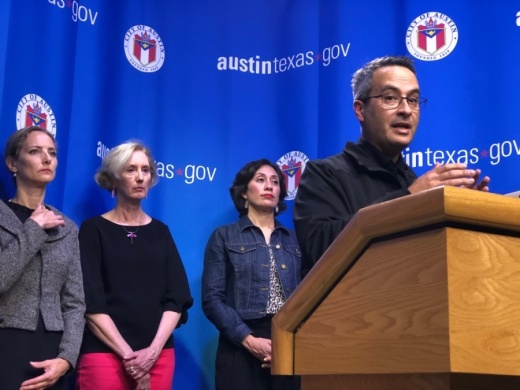Local officials June 11 warned those numbers are not a result of increased testing capacity, including Gov. Greg Abbott’s mandate that coronavirus testing take place in the state’s nursing homes.
Instead, Dr. Mark Escott, the Austin-Travis County interim health authority, stated these record-high numbers come after the Memorial Day holiday and the reopening of Texas' economy.
“We have no indication ... that these numbers we’re seeing are related to nursing home testing results,” Escott said. “These seem to be related to ongoing community spread.”
Austin and Travis County on June 9 reported 161 new cases of coronavirus, the highest single-day total recorded by Austin Public Health. The health department recorded more than 100 new coronavirus cases from June 8-10, the last day of publicly available data.
APH had never reported 100 or more new cases of coronavirus in a single day until June 8. The previous single-day high was 88 new cases on June 1.
“We’ve had a substantial increase in the past three days of new cases. This is a concerning trend for us,” Escott said.
Similarly, hospitalizations for complications related to COVID-19 reached a single-day high on June 10. APH reported 24 patients have been hospitalized with COVID-19, topping the previous high of 18 patients.
Escott warned the increasing hospitalization rate, in addition to a climbing rate of residents testing positive for the coronavirus, leads him to believe the increase in single-day coronavirus cases is not related to increased testing.
“Some folks have said, ‘Maybe this is related to all the testing that you’re doing. You’re testing a bunch more people and therefore you’re finding a bunch more cases.’ The reflection of new hospitalization suggests that's not the case,” Escott said.
Due to a small backlog in tests at laboratories, Escott said these cases beginning June 8 are from patients tested at the beginning of June.
“These are likely transmissions that happened closer to Memorial Day,” Escott said.
Escott and other local leaders said the recent spike in coronavirus cases is unrelated to the historic protests that have continued throughout Austin over the past several weeks. While these gatherings create an environment where the coronavirus could potentially spread at a high rate, Escott said, tests that may have been conducted following the demonstrations have not yet come back.
Health officials June 3 said all individuals who attended the protests downtown should utilize Austin’s free public coronavirus testing.
Austin Mayor Steve Adler said the stay-in-place orders originally enacted by the city in March will likely have to be renewed for another month. The current orders expire June 15, Adler said.
With the recent surge in cases, Adler said city and county leaders are monitoring the climbing hospitalization rate to determine if the city will enter into its next risk stage. On May 29, the city released its key indicators illustrating how the city determines which risk stage it is in. APH’s five-stage risk chart offers recommendations on how the community should respond to a range of coronavirus risk levels.
Currently, the city is in the third stage of the risk level chart. If the rolling seven-day average of hospitalizations increases to 20 or more cases, the city will go into the fourth stage in the risk chart. At that point, it is recommended that high-risk individuals avoid gatherings of more than two people.
“It’s still early, and we still have the opportunity to get a handle of this. It’s going to take the entire community being vigilant,” Adler said. “We have to do better.”
Even if the city extends its stay-at-home order and increases the risk stage the city is in, the state’s reopening rules supersede anything implemented by the city. As hospitalization rates climb, local leaders could likely only offer recommendations to residents to avoid making contact with infected persons and spreading the coronavirus, former Travis County Judge Sarah Eckhardt said.
“Unfortunately the governor has taken most of our enforcement rules off the table,” Eckhardt said.
In the past several weeks, under Abbott’s orders, the state of Texas has reopened restaurants, bars, businesses, swimming pools, amusement parks and more with expanded capacities in an attempt to restart the struggling Texas economy.
Ahead of upcoming summer holidays, such as Juneteenth and Independence Day, Eckhardt urged residents to reconsider how they celebrate with considerations for coronavirus precautions in mind.
“We won’t be able to keep hospitalizations below 20 if people don’t follow the necessary precautions—that’s plain,” Eckhardt said.





